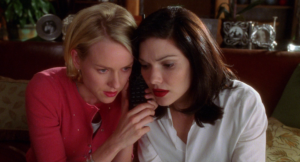 Attend: Program Notes
Attend: Program Notes
Mulholland Dr. | David Lynch | USA | 2001 | 146 minutes
Cinesthesia, Madison Public Library Central Branch, Thursday, October 6, 6:00pm»
Programmer Jason Fuhrman shares his program notes for David Lynch’s Mulholland Dr., which will screen at the October edition of his Cinesthesia series at the Madison Public Library.
Editor’s Note: The Madison Film Forum is happy to introduce what we hope will be an ongoing series: Monthly program notes by Jason Fuhrman for his Cinesthesia series. More information about Cinesthesia and upcoming events can be found at its Facebook page and at the Madison Public Library website.
“I don’t know what I want to say to people. I get ideas and I want to put them on film because they thrill me. You may say that people look for meaning in everything, but they don’t. They’ve got life going on around them, but they don’t look for meaning there. They look for meaning when they go to a movie. I don’t know why people expect art to make sense when they accept the fact that life doesn’t make sense.” — David Lynch, 1989
A complex, mysterious and nonlinear movie that requires the active participation of the viewer, Mulholland Dr. was originally conceived as the pilot episode for a proposed (and eventually rejected) television series to be aired on ABC. For the most part, David Lynch’s surrealist neo-noir masterpiece consists of a reedited TV pilot plus fifty minutes or so of additional material shot nearly two years later. Therefore it is something like a synthesis of a feature-length film and a television series, as if Lynch had been forced to leap directly from the open-ended pilot episode of Twin Peaks to the movie Twin Peaks: Fire Walk with Me—without the advantage of all the intricate plot and character development in between. Despite its unusual production history, the film should not be viewed as a salvage operation, since it was in the process of reimagining Mulholland Dr. that Lynch created what filmmaker and writer Chris Rodley considers “his most deliriously radical work”.
What is Lynch trying to say? The director never interprets his art, and he has been particularly reluctant to explain or analyze the luscious puzzle that is Mulholland Dr. This is evidenced by his synopsis of the movie: “Part one: she found herself inside the perfect mystery. Part two: a sad illusion. Part three: love.”
Although Mulholland Dr. has inspired a popular obsession with solving its mystery, this is somewhat beside the point. Much more than an enigma to be deciphered, Mulholland Dr. takes as its subject the very act of solving: the absurd process of making narrative sense, of needing and creating meaning. The film’s power, indeed its beauty, derives from its essential ambiguity. With a fractured, elliptical story, exquisite visual detail, and a seamless succession of strange atmospheres, Mulholland Dr. summons us toward full immersion in a dreamlike sensory experience as we abandon ourselves to its magnetic flow.
Mulholland Dr. had its premiere at the Cannes Film Festival in May 2001. While the film gained immediate critical success, those who admired it also claimed to be mystified. (Variety declared it “compelling but intentionally inscrutable.”) The jury awarded the best director prize jointly to Lynch and Joel Cohen (for The Man Who Wasn’t There). Despite an underwhelming domestic gross of $7 million, Mulholland Dr. earned Lynch an Academy Award nomination for Best Director, his third. Year-end critics’ polls in the Village Voice and Film Comment named it the best film of 2001. A recent poll by BBC Culture of 177 film critics from 36 countries named Mulholland Dr. the greatest film of the 21st century.
Cast: Laura Elena Harring, Naomi Watts, Justin Theroux, Ann Miller, Robert Forster, Dan Hedaya.